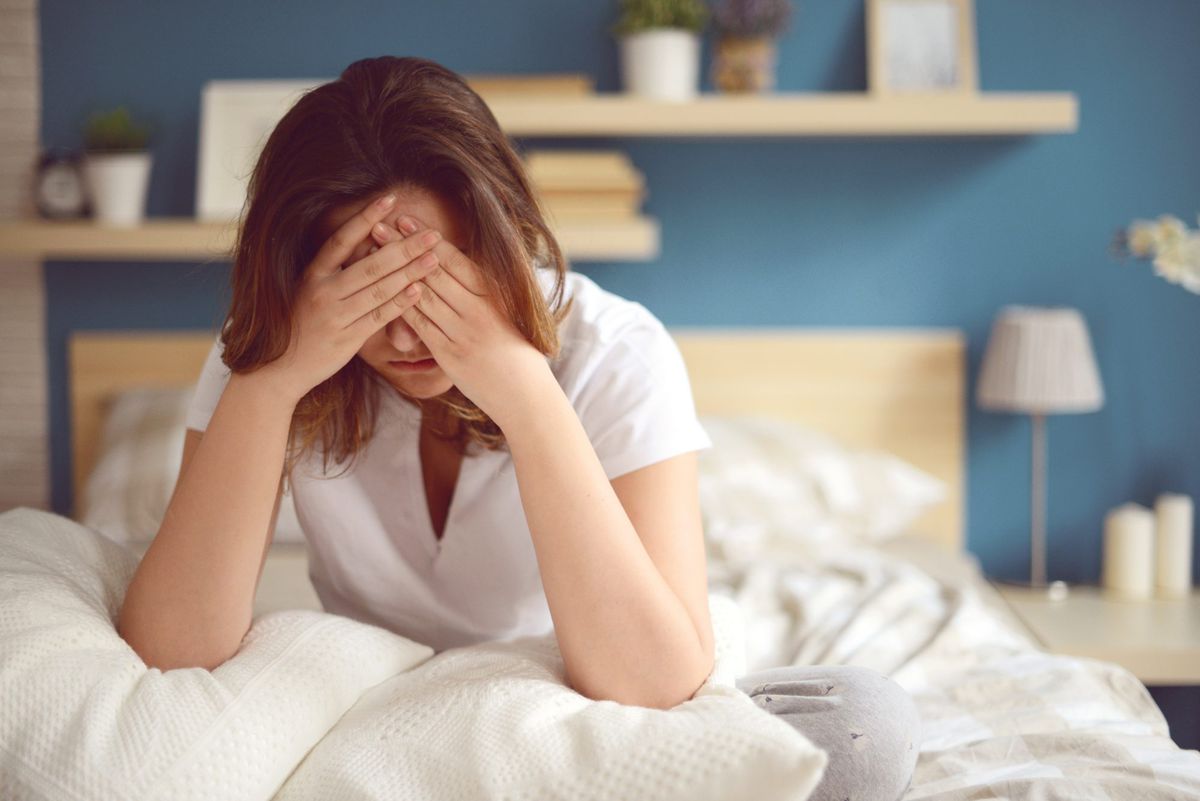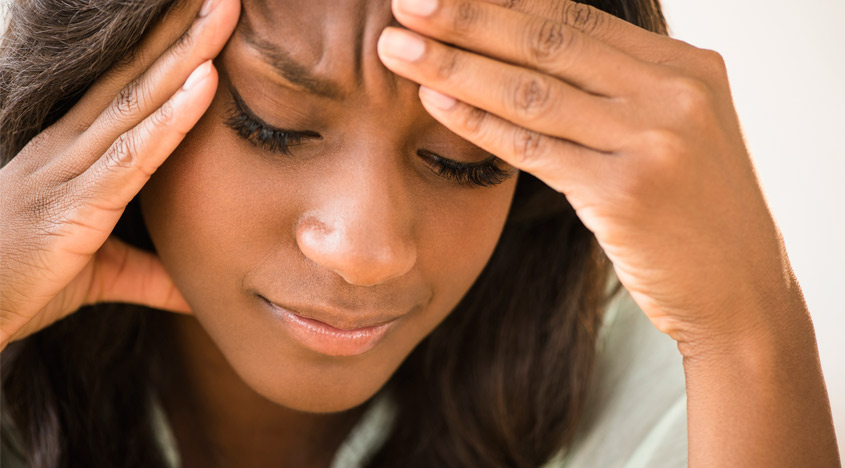The symptoms of anxiety can be hard to detect. Here are the ones you need to pay attention to, and how to know if you may have an anxiety disorder.
What does it mean to have an anxiety disorder?

Everyone can expect to have the occasional bout of anxiety—maybe you get nervous before an interview or a first date—but sometimes, that anxiety doesn’t subside, which may indicate an anxiety disorder.
According to the National Institute of Mental Health (NIMH), there are a few different types of anxiety disorders, including generalized anxiety disorder, panic disorder, and phobia-related anxiety disorders, but they all hinge on one important aspect: when overwhelming feelings of worry or fear impinge on a person’s daily life.
Researchers believe that anxiety disorders can stem from both genetic and environmental factors, and these anxiety disorders are typically treated through a variety of interventions, including psychotherapy, medication, or a combination of the two, according to the NIMH.
While anxiety disorders are often hard to pinpoint—and often benefit from a correct diagnosis from a mental health professional—there are some signs and symptoms that are common among those with most types of anxiety disorders. Here’s what you need to know, and including when you should seek professional help.
Excessive worry

Again, the occasional worries are normal—but for those with generalized anxiety disorder (GAD), those worries don’t necessarily go away.
According to the NIMH, people with GAD worry about typical things—including health, money, or family problems—but on a larger scale. They continue to worry about those things even when there’s not a clear reason to worry. This anxiety is also often hard to control and makes it difficult for sufferers to focus on their daily tasks.
3. Sleep
Adults typically need seven to nine hours of sleep every night—and when your sleep schedule starts to suffer, it’s a sign that something is off.
According to the Anxiety and Depression Association of America (ADAA), stress and anxiety can cause sleeping problems, or make other issues, like falling and staying asleep, worse. Because sleeping disorders can lead to anxiety—or anxiety can lead to sleeping disorders—it’s best to talk to your doctor to determine the underlying causes and what you can do to correct them.

Some anxiety isn’t generalized at all; on the contrary, it’s attached to a specific situation or thing—like flying, animals, or crowds. If the fear becomes overwhelming, disruptive, and way out of proportion to the actual risk involved, it’s a telltale sign of phobia, a type of anxiety disorder.
Although phobias can be crippling, they’re not obvious at all times. In fact, they may not surface until you confront a specific situation and discover you’re incapable of overcoming your fear. “A person who’s afraid of snakes can go for years without having a problem,” Winston says. “But then suddenly their kid wants to go camping, and they realize they need treatment.”
Musle Tension
Near-constant muscle tension—whether it consists of clenching your jaw, balling your fists, or flexing muscles throughout your body—often accompanies anxiety disorders. This symptom can be so persistent and pervasive that people who have lived with it for a long time may stop noticing it after a while.
Regular exercise can help keep muscle tension under control, but the tension may flare up if an injury or other unforeseen event disrupts a person’s workout habits, Winston says. “Suddenly they’re a wreck because they can’t handle their anxiety in that way and now they’re incredibly restless and irritable.”
Chronic indigestion

CREDIT: G-STOCKSTUDIO/GETTY IMAGES
Sometimes, anxiety can cause more than a “butterflies in your stomach” feeling. In fact, digestive issues—nausea, diarrhea, indigestion—are some of the main complaints linked to anxiety disorders, per the ADAA.
While there are steps you can take to lessen your GI pain due to anxiety, like taking deep breaths, getting regular exercise, and even following daily guided meditations, your best route is to seek out help from a therapist who specializes in anxiety and who can come up with a treatment plan.
Stage Fright
Stage fright is another anxiety symptom. Most people get at least a few butterflies before addressing a group or otherwise being in the spotlight. But if the fear is so strong that no amount of coaching or practice will alleviate it, or if you spend a lot of time thinking and worrying about it, you may have a form of social anxiety disorder (also known as social phobia).
People with social anxiety tend to worry for days or weeks leading up to a particular event or situation. And if they do manage to go through with it, they tend to be deeply uncomfortable and may dwell on it for a long time afterward, wondering how they were judged.
Self=Consciousness
Social anxiety disorder doesn’t always involve speaking to a crowd or being the centre of attention. In most cases, the anxiety is provoked by everyday situations, such as making one-on-one conversation at a party, or eating and drinking in front of even a small number of people.
In these situations, people with social anxiety disorder tend to feel self-conscious, as if all eyes are on them, and they often experience blushing, trembling, nausea, profuse sweating, or difficulty talking. These symptoms can be so disruptive that they make it hard to meet new people, maintain relationships, and advance at work or in school.N
Panic

CREDIT: ANTONIOGUILLEM/GETTY IMAGES
Panic attacks
can be terrifying: Picture a sudden, gripping feeling of fear and helplessness that can last for several minutes, accompanied by scary physical symptoms such as breathing problems, a pounding or racing heart, tingling or numb hands, sweating, weakness or dizziness, chest pain, stomach pain, and feeling hot or cold.
These super-common physical signs “are primarily due to the ‘fight or flight response by the body,” James Killian, a licensed professional counsellor and owner of Arcadian Counseling in Woodbridge, Connecticut, tells Health. “When you’re in a continuous state of heightened arousal, your brain sends increased levels of cortisol and adrenaline throughout your body, which creates these physical symptoms.”
Not everyone who has a panic attack has an anxiety disorder, but people who experience them repeatedly may be diagnosed with panic disorder. People with panic disorder live in fear about when, where, and why their next attack might happen, and they tend to avoid places where attacks have occurred in the past.
Flashbacks
Reliving a disturbing or traumatic event—a violent encounter, the sudden death of a loved one—is a hallmark symptom of post-traumatic stress disorder (PTSD), which shares some features with anxiety disorders. (Until very recently, in fact, PTSD was seen as a type of anxiety disorder rather than a stand-alone condition.)
But flashbacks may occur with other types of anxiety as well. Some research, including a study in the Journal of Anxiety Disorders, suggests that some people with social anxiety have PTSD-like flashbacks of experiences that might not seem obviously traumatic, such as being publicly ridiculed. These people may even avoid reminders of the experience—another symptom reminiscent of PTSD.N
Perfectionism

CREDIT: GETTY IMAGES
The obsessive mindset is known as perfectionism “goes hand-in-hand with anxiety disorders,” Winston says. “If you are constantly judging yourself or you have a lot of anticipatory anxiety about making mistakes or falling short of your standards, then you probably have an anxiety disorder.”
Perfectionism is especially common in obsessive-compulsive disorder (OCD), which, like PTSD, had long been viewed as an anxiety disorder. “OCD can happen subtly, like in the case of somebody who can’t get out of the house for three hours because their makeup has to be absolutely just right and they have to keep starting over,” Winston says.

